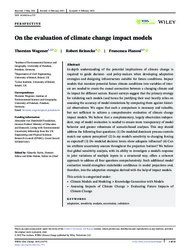On the evaluation of climate change impact models
DOI: https://doi.org/10.1002/wcc.772
Persistent URL: http://resolver.sub.uni-goettingen.de/purl?gldocs-11858/10071
Persistent URL: http://resolver.sub.uni-goettingen.de/purl?gldocs-11858/10071
Wagener, Thorsten; Reinecke, Robert; Pianosi, Francesca, 2022: On the evaluation of climate change impact models. In: Wiley Interdisciplinary Reviews: Climate Change, Band 13, 3, DOI: 10.1002/wcc.772.
 |
Dokument öffnen: |
In‐depth understanding of the potential implications of climate change is required to guide decision‐ and policy‐makers when developing adaptation strategies and designing infrastructure suitable for future conditions. Impact models that translate potential future climate conditions into variables of interest are needed to create the causal connection between a changing climate and its impact for different sectors. Recent surveys suggest that the primary strategy for validating such models (and hence for justifying their use) heavily relies on assessing the accuracy of model simulations by comparing them against historical observations. We argue that such a comparison is necessary and valuable, but not sufficient to achieve a comprehensive evaluation of climate change impact models. We believe that a complementary, largely observation‐independent, step of model evaluation is needed to ensure more transparency of model behavior and greater robustness of scenario‐based analyses. This step should address the following four questions: (1) Do modeled dominant process controls match our system perception? (2) Is my model's sensitivity to changing forcing as expected? (3) Do modeled decision levers show adequate influence? (4) Can we attribute uncertainty sources throughout the projection horizon? We believe that global sensitivity analysis, with its ability to investigate a model's response to joint variations of multiple inputs in a structured way, offers a coherent approach to address all four questions comprehensively. Such additional model evaluation would strengthen stakeholder confidence in model projections and, therefore, into the adaptation strategies derived with the help of impact models. A comprehensive evaluation of climate change impact models combining both observation‐based and response‐based strategies. This article is categorized under:
Climate Models and Modeling > Knowledge Generation with Models
Assessing Impacts of Climate Change > Evaluating Future Impacts of Climate Change
Statistik:
ZugriffsstatistikSammlung:
Schlagworte:
adaptationsensitivity analysis
uncertainty
validation
climate change
climate models
model simulation
This is an open access article under the terms of the Creative Commons Attribution License, which permits use, distribution and reproduction in any medium, provided the original work is properly cited.

